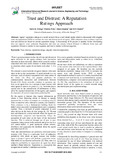| dc.contributor.author | Ntwiga, Davis B | |
| dc.contributor.author | Weke, Patrick | |
| dc.contributor.author | Manene, Moses | |
| dc.contributor.author | Maniki, Ivivi | |
| dc.date.accessioned | 2016-06-07T08:00:51Z | |
| dc.date.available | 2016-06-07T08:00:51Z | |
| dc.date.issued | 2016 | |
| dc.identifier.citation | nternational Advanced Research Journal in Science, Engineering and Technology Vol. 3, Issue 2, February 2016 | en_US |
| dc.identifier.uri | http://hdl.handle.net/11295/96051 | |
| dc.description.abstract | Agents’ reputation ratings in a social network form a real valued matrix which is discounted with singular
value decomposition (SVD) to estimate the trust and distrust levels of agents. SVD eliminates noise as future expected
trust and distrust are based on current reputation ratings. A discounting of 20 percent is optimal, further discounting
does not improve error reduction. Reputation and trust are closely related. Distrust is different from trust and
reputation. Distrust is similar to trust negation; and trust is similar to distrust negation. | en_US |
| dc.language.iso | en | en_US |
| dc.rights | Attribution-NonCommercial-NoDerivs 3.0 United States | * |
| dc.rights.uri | http://creativecommons.org/licenses/by-nc-nd/3.0/us/ | * |
| dc.subject | Trust | en_US |
| dc.subject | Distrust | en_US |
| dc.subject | Reputation ratings | en_US |
| dc.subject | Singular value decomposition | en_US |
| dc.title | Trust and Distrust: A Reputation Ratings Approach | en_US |
| dc.type | Article | en_US |



